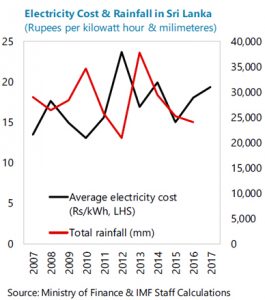
Cabinet approval for electricity pricing mechanism expected by Sept: IMF
June 22, 2018 (LBO) – Cabinet approval for an automatic tariff adjustment mechanism for electricity under the 2015 tariff methodology is expected by September, an International Monetary Fund (IMF) report said.
The 2015 tariff methodology introduces price stability by fixing tariffs over a period of six months, protecting end-users from volatility in the exchange rate, international prices of fuel and coal, and weather conditions.
The IMF staff report detailing the mechanism said electricity subsidies should be contained because they tend to benefit the rich more than the poor.
“Tariffs will reflect a forecast of likely developments in supply and cost for the forthcoming six months, ensuring that discrepancies between cost and price are eliminated over time,” the IMF said.
“To mitigate the distributional impact of higher end-user electricity tariffs on the poorer segments of the population, lifeline tariffs and/or targeted cash transfers can be used.”
Ongoing reforms on social safety nets to improve targeting and coverage of existing social assistance programs are critical to support these efforts, the IMF said.
The report said droughts pose a significant fiscal risk on power generation due to Sri Lanka’s reliance on hydro electricity generation and administered tariffs.
Hydropower generation accounts for 30 percent of the total electricity generation capacity in Sri Lanka.
Droughts result in low hydro utilization and boost need for thermal generation (coal & oil), raising the cost of supplying electricity. The 2017 drought raised the average electricity cost to about Rs 20 per kWh.
“Unless end-user tariffs are adjusted to cost-recovery levels, elevated electricity costs result in quasi-fiscal losses for the Ceylon Electricity Board,” the IMF said.
“In fact, as end-user tariffs have not been adjusted since 2014, CEB incurred losses of 0.4 percent of GDP in 2017.”
The planned introduction of an automatic pricing mechanism for electricity, combined with well-targeted safety nets, can contain fiscal risks from droughts, the IMF further said.


